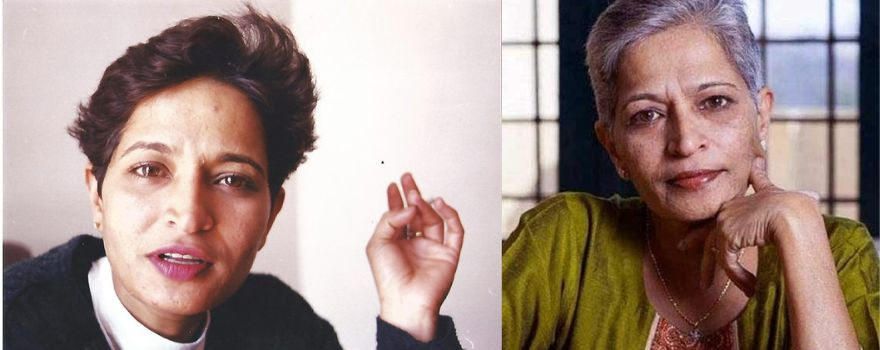Remembering Gauri Lankesh: The Fearless Journalist Who Refused to Stay Silent
29 JAN 2025
On her birth anniversary, we remember Gauri Lankesh—an uncompromising journalist, fearless activist, and relentless voice against authoritarianism. Her words may have been silenced, but her legacy continues to inspire.

On January 29, 1962, in a Lingayat family, a girl was born who would go on to become one of India's most fearless voices against majoritarian politics. Gauri Lankesh grew up in a household where words carried weight. Her father, P. Lankesh, was a well-known poet and journalist who established the Kannada-language tabloid Lankesh Patrike. The publication was known for its uncompromising stance against authoritarianism, a principle that Gauri would later inherit and uphold with unwavering determination.
Her journey into journalism began with The Times of India in Bangalore, a stepping stone that took her to Delhi, where she worked with Sunday Magazine for nine years. Her marriage to journalist Chidanand Rajghatta did not last, and she returned to Bangalore, where she eventually took over her father's publication following his death in 2000. It was a defining moment—one that placed her at the forefront of independent journalism in Karnataka. She did not just continue Lankesh Patrike; she made it her own, shaping it into a platform that spoke for the marginalized and held the powerful accountable.
A Voice that Could not be Silenced
Gauri’s journalism was never about neutrality. She believed in taking a stand. Her opposition to right-wing politics, especially the growing influence of Hindutva, made her both revered and reviled. She criticized religious fundamentalism, the caste system, and the silencing of dissent. Her pieces were sharp, unapologetic, and deeply political. She was not merely a reporter; she was an activist in every sense of the word.
Filmmaker K.M. Chaitanya, who knew Gauri from childhood, once said, “Wanting to live up to the expectations of her father, she decided to continue running the Patrike. Once she made that decision, she knew she had a huge responsibility. The BJP was rising at that time, and she thought that being an activist would help. She decided to become aggressive, and being aggressive meant becoming an activist.”
Her friends and colleagues remember her as someone who did not shy away from confrontations. Actor Belavadi recalled how she once called him and angrily questioned his support for Narendra Modi, attributing it to his privileged background. Journalist Srinivasaraju noted that every conversation with her was a whirlwind—she could start with fierce arguments and suddenly turn emotional, her passion for justice evident in every exchange.


The Risk of Speaking Truth to Power
Gauri’s work made her a target. She faced legal battles, threats, and relentless online abuse. In 2008, she was sued for defamation after publishing a report accusing BJP leader Prahlad Joshi and two others of cheating a jeweler. Rather than responding with intimidation, Joshi pursued legal action, a rare move in a climate where threats and violence had become tools of suppression.
Her speeches further fueled the anger of her detractors. In one address in 2014, she questioned the very foundation of Hinduism, challenging its historical roots and structured hierarchy. Her views were bound to provoke, but they were not meant to incite—only to question, analyze, and push for conversations that many wished to avoid.
The Night that Shook the Nation
On September 5, 2017, as Gauri returned home from work, a man wearing a helmet approached her. As she moved towards her house, she was shot multiple times. She collapsed just a few feet away from her doorstep. Security footage later revealed that two more men had followed her, ensuring the attack was carried out without failure. She died almost instantly.
Her murder sent shockwaves across the country. Thousands took to the streets, holding vigils and protests, carrying banners that read “I Am Gauri.” Her killing was not seen as an isolated incident but part of a disturbing pattern—the silencing of voices that opposed Hindutva ideology. Many pointed to the assassinations of other rationalists like M.M. Kalburgi, Govind Pansare, and Narendra Dabholkar, linking them to the same forces that wanted dissent wiped out.
Her lawyer called it a premeditated attack by radical Hindu groups, a claim that resonated with those who had followed her work. Gauri was posthumously awarded the Anna Politkovskaya Award, named after the Russian journalist who was assassinated in 2006. It was a recognition of the dangers journalists face when they refuse to conform.
Walter Lippmann once wrote, “There can be no higher law in journalism than to tell the truth and to shame the devil.” Gauri lived by this principle, but it came at a heavy cost. She was not just a journalist; she was a woman who refused to be silenced, even in a landscape where outspoken female journalists faced relentless threats, online harassment, and intimidation.
In a conversation with a friend about caste, she once said, “Yes, I am rich, I live in a big house, and I am very privileged. Come up with a better argument as to why I, as a woman, should not be part of the anti-caste struggle.” She was acutely aware of her privileges but chose to use them to fight for those who could not.
Gauri Lankesh was not afraid of taking a stand, even when it made her enemies. She stood for free speech, secularism, and social justice. Her life and her work remain a reminder of the power of an uncompromising voice, a voice that even bullets could not erase.
1731658260.jpg)
1733394312.jpg)
1732276243.jpg)


















